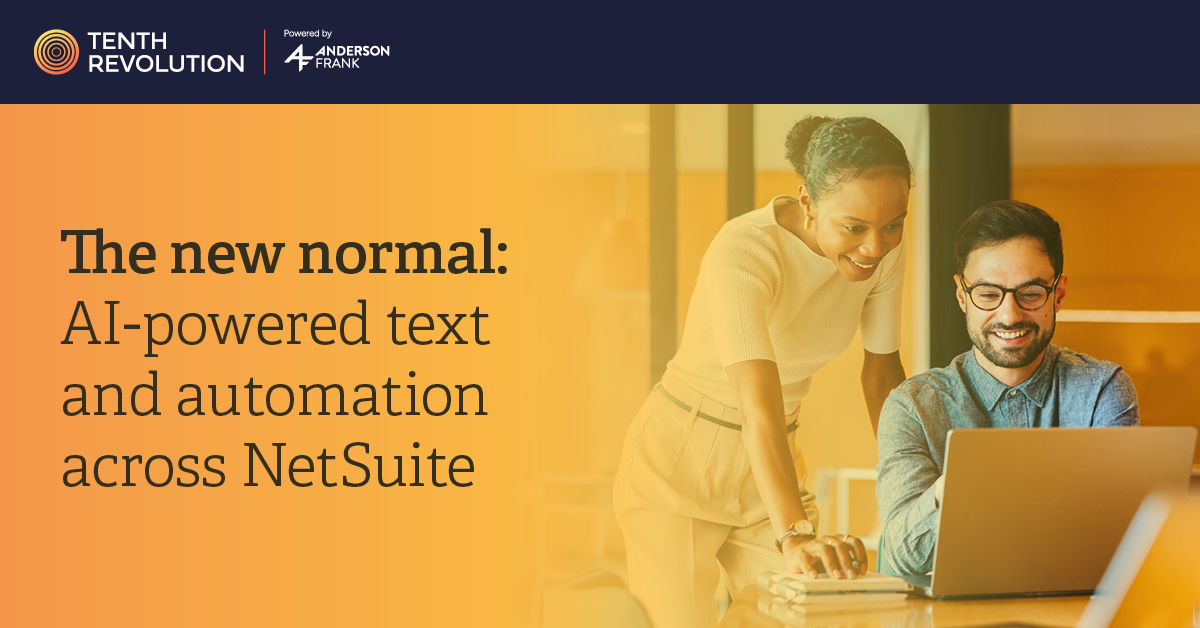
AI in NetSuite is moving beyond proof-of-concept and into everyday workflows.
With tools like Text Enhance and AI-assisted automation embedded directly into the platform, finance and operations teams are beginning to experience a new way of working.
Instead of spending hours drafting commentary, keying invoices, or chasing approvals, staff can lean on AI to handle repetitive tasks while focusing their energy on strategy and judgment.
What everyday AI looks like in NetSuite
Executives often ask how generative AI shows up in daily NetSuite usage. The answer lies in practical, embedded support inside existing workflows rather than futuristic add-ons.
Text Enhance for communication: Draft polished messages for invoices, management reports, or vendor reminders directly in NetSuite. Teams refine and approve but no longer start from a blank page.
Invoice automation with Bill Capture: Scan vendor bills, capture line items, and automatically populate NetSuite records. Approval rules apply, and discrepancies are flagged without manual intervention.
Smart collections and reminders: AI generates tailored follow-ups for overdue accounts, adjusting tone and message history for each customer.
Close-cycle acceleration: Draft commentary, automated reconciliations, and anomaly detection all feed into faster and more reliable period closes.
Anderson Frank provides NetSuite talent who can implement AI features in a way that makes everyday finance easier, from automation experts to specialists in predictive workflows.
Why this matters for executives
AI in NetSuite is not about replacing finance professionals but about giving them more leverage. By automating routine work, teams can:
Increase productivity without expanding headcount.
Improve accuracy by reducing manual entry and reconciliation errors.
Respond faster to stakeholders with AI-generated drafts and real-time insights.
Boost engagement by shifting time toward higher-value analysis.
In Anderson Frank’s 2025 NetSuite Careers and Hiring Guide, 58% of NetSuite professionals said they want to spend more time on strategic work rather than administration. Embedding AI directly into workflows is one way for leaders to make that possible.
Anderson Frank offers NetSuite specialists who understand how to configure and manage AI automation so that finance professionals can focus on delivering insight and value.
How adoption is unfolding
Businesses are introducing AI gradually, layering it into the processes where it delivers the greatest impact. Common entry points include:
Customer communication: Using Text Enhance for first drafts of client-facing emails.
Accounts payable: Deploying Bill Capture for high-volume invoice intake.
Collections: Automating overdue reminders with personalized messaging.
Financial close: Accelerating reconciliations and reporting commentary.
A day in the life with AI
Imagine a typical Monday morning. Instead of drafting management commentary, the CFO reviews an AI-generated narrative highlighting revenue trends and cost anomalies. The AP team finds invoices already populated in NetSuite, with approvals routed automatically. Collections staff approve AI-generated reminders and send them with a single click.
By midday, leaders are no longer buried in administrative tasks—they are focused on discussing strategy, supported by fresh insights. That is the new normal NetSuite is enabling.
Preparing your business for the new normal
Leaders who want to maximize value from AI in NetSuite should:
Begin with high-volume processes like invoice capture or collections.
Treat AI outputs as drafts to refine, ensuring oversight and credibility.
Train staff on how to interpret and challenge AI-driven insights.
Track KPIs such as invoice cycle time, close duration, and DSO to measure impact.
Expand gradually into forecasting, scenario planning, and anomaly detection



